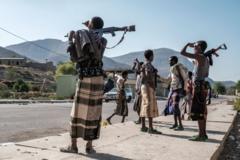The Tigray People's Liberation Front warns of potential conflict resurgence as it faces a ban from political activities, threatening the peace established in 2022.
Tigray Party Warns of Peace Deal Risk Amid Ban by Electoral Board

Tigray Party Warns of Peace Deal Risk Amid Ban by Electoral Board
Ethiopia's TPLF urges African Union intervention, claiming ban endangers fragile peace agreement.
In a developing political landscape in Ethiopia, the Tigray People's Liberation Front (TPLF) has issued a clarion call for African Union mediation following the recent revocation of its legal status as a political party by the electoral board. This contentious decision, stemming from the TPLF's failure to convene a general assembly, has escalated fears of renewed hostilities in the region, particularly in light of the fragile peace agreement struck in late 2022 that ended years of brutal conflict in northern Ethiopia.
Characterized as a "serious threat" to the peace process, the TPLF condemned the ban, asserting that it jeopardizes the hard-fought stability secured by the Pretoria peace agreement. The Tigray party, which has been instrumental in the region’s governance, expressed concerns that the electoral board's actions could undermine the legitimacy established by the deal and harm the recent progress made to address the humanitarian crisis affecting millions in the area.
Prior to the ban, the TPLF had been tumultuously navigating internal divisions with two factions vying for control. Their inability to hold party elections amidst these tensions raised concerns of political instability, further compounded by the backdrop of upcoming nationwide elections scheduled for June 2024.
Amidst reports of escalating tensions, TPLF deputy chairman Ammanuel Assefa voiced alarm over the potential ramifications of this ban on the broader peace process. He emphasized that the implications stretch beyond the TPLF, encompassing a wider spectrum of challenges faced by a population yearning for peace after enduring significant sacrifices during the civil war that displaced millions and claimed tens of thousands of lives.
As international observers, including the US, UK, and EU, urge against a return to violence, the onus appears to be on the Ethiopian government and the TPLF to foster dialogue and uphold the terms of the peace agreement. Delays in fulfilling commitments laid out in the deal, such as the resettlement of approximately one million displaced individuals, only amplify fears of a rekindled conflict in this strategically significant and tumultuous region.



















